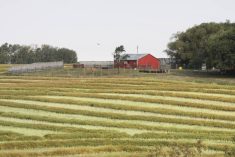Fifteen years ago, when Marvin Elder heard from his wife, a teacher, that many of her students hadn’t a clue where their food came from, he decided to volunteer with Agriculture in the Classroom – Manitoba Inc.
“It wasn’t long after Margaret started teaching at Virden. Even in a small, rural place like that, she noticed that a number of her Grade 2 and 3 students had no idea that food didn’t just come from the store on King Street,” said Elder, a grain farmer for 42 years on a 2,100 acre farm north of Oak Lake, Man.
Read Also

Nutritious pork packed with vitamins, essential minerals
Recipes for pork
“We thought, if it’s like that in Virden, what’s it like in Brandon and Winnipeg?”
Elder, who has been a board member with the non-profit AITC organization for eight years and retired from farming for nine, said most children in the province are now two generations removed from the farm.
“Years ago, just about everybody had relatives on the farm. But now you don’t have that,” he said. “It’s very sad because the farmers don’t get any recognition, and everyone just hears them whining about stuff.”
As a volunteer, Elder helps run the Amazing Agriculture Adventure, a hands-on, interactive event geared toward the Grade 4 and 5 science curriculum.
In the program, students move through four stations with activities covering livestock production, nutrients, beekeeping and machinery. Since it was launched in 1999, more than 13,000 children have participated.
“The nutrient end helps kids realize that plants need food the same as they do,” he said. “Of course the kids love the livestock part. That’s more of an entertaining thing.”
The machinery aspect covers farm safety but also shows students the capital cost of modern farming equipment. The beekeeping exhibit features a demonstration hive and discussions about pollination and honey production.
This year the program will host about 250 students June 5-6 in the days leading up to the Provincial Exhibition in Brandon, and 400 students during three days at Red River Exhibition Park in Winnipeg, Sept. 11-13.
At Manitoba Ag Days last January, Grade 7-8 students participated in the Amazing Agriculture Race, a scavenger hunt for information.
Given a list of 20 exhibitor booths, the students were required to visit each one, ask questions and complete a report on a variety of subjects. These ranged from the cost of outfitting a 1,500 acre farm with all new machinery, to how many acres can be seeded and at what cost with different types of equipment.
Elder said the most beneficial result of the organization’s efforts can be seen in the effect it has on the teachers who bring their classes.
“I find that the biggest impression is made on the teachers. If you get through to the teachers, then you’re going to get through to the students,” he said.
“We get a lot of positive responses from the parents, too.”
Johanne Ross, executive director of Manitoba’s AITC, said that besides the recent launch of a new logo and an updated website, newer initiatives undertaken by the organization include Ag in the City and Teacher Learning Adventure.
Ag in the City is a workshop aimed at showing educators that parts of the agriculture industry can be found in urban areas, not just in the country. Once teachers become aware of this fact, they are often more willing to bring discussions about the various high paying jobs available in the ag sector into the classroom, Ross said.
Teacher Learning Adventure consists of five-day summer retreats for 18 teachers at a time designed to give them a feel for the rural lifestyle and an understanding of the diversity of modern farming.
“It’s life-changing for them. They understand better why agriculture is important to them and why they should bring it to their students.”
Since it was created in 2003, the program has had three sessions of 18 teachers each.
“It’s great. They become wonderful ambassadors in their schools and also with their colleagues. It gets them talking about agriculture in their schools and that’s what we’re all about,” said Ross.
High school age students are targeted with school visits and presentations about future careers in agriculture-related fields.
One of the most popular initiatives involves representatives from different commodity groups in the province serving a complete buffet breakfast using only local products such as Manitoba-raised pork sausages, pancakes using locally ground flour, eggs, milk, canola margarine and honey.
“The great thing about our Made in Manitoba breakfast is that we can tailor it to any age group,” said Ross. “With kids, anything that involves food goes over really well.”
















